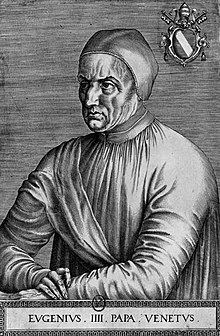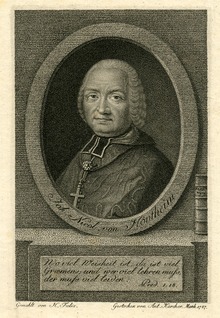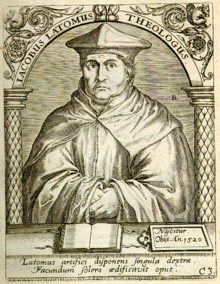History
During the Middle Ages, a studium generale was often rounded out after a short time with the foundation of a Faculty of Theology. After repeated requests from the municipal government, from the Duke of Brabant and from Philip the Good, the university received permission to grant theological degrees from Pope Eugene IV on 7 March 1432. Professors for the new faculty were first recruited from already existing theological faculties, particularly those of the University of Paris and the University of Cologne. Instruction in the old faculty of theology was thus closely based on the theological developments of these sister faculties. Students wishing to earn the degree of Sacrae Theologiae Licentiatus were taught and required to comment upon the Scriptures and Peter Lombard's Book of Sentences, and they took part in disputations that were a typical part of medieval university education. The most famous theologian from the 15th century faculty was Adrian Floriszoon of Utrecht. He taught in Leuven from 1491 to 1515 and later became Pope Adrian VI.
Throughout the sixteenth and seventeenth centuries Adrian's successors made a name for themselves by resourcing theology through a renewed study of Augustine. The Leuven Faculty and its magisters anticipated several of the theological trends that emerged in their time. An example of this is seen in Jacobus Latomus's De trium linguarum et studii theologici ratione dialogus, which was published in 1519 as a response to the challenge posed by the work of Desiderius Erasmus, who was active at the Collegium Trilingue in Leuven. Later theologians such as Johannes Driedo also strongly opposed Erasmian thought, saying it was a contemporary brand of Pelagianism. At the same time, the faculty also opposed Martin Luther's thought, by refuting his early writings in a censure published on 7 November 1519. Ruard Tapper, another Leuven theologian, led the controversy by drawing up a summary of the Catholic position in 59 articles, later reduced to 39 articles.
On top of this, Leuven's Theological Faculty also played an active role during the Council of Trent. Among the delegates to the council were several of its professors, including theologians like Tapper, Johannes Hesselius, and Michael Baius. In addition, Johannes Driedo's works were influential and circulated among the Tridentine Council Fathers.
In 1546 two Royal Chairs were granted to the faculty by Charles V, in addition to the five already existing chairs. One of these new chairs was dedicated to the study of Scripture. A characteristic of this period was the transition the Leuven faculty made from a scholastic theology to a more positive theology based on Scripture and the Church Fathers. A specific brand of Leuven Augustinianism developed in this context, and characterized the faculty and its theology throughout the eighteenth century, thus allowing the faculty to procure its own position within the Counter-Reformation. Here the faculty set the tone by publishing an Index of Forbidden Books (1546, reworked in 1550). This Index was the first of its kind and served as a model for the later Roman Index librorum prohibitorum published in 1559 by Pope Paul IV.
In 1547 the faculty published a new version of the Vulgate, which was submitted to better revisions. This new translation was used by the committee charged with preparing an official edition of the Vulgate in the seventeenth century under the authority of Pope Paul V. The faculty's growing scientific specialization was manifest in the publishing of two major works: the six language Biblia Polyglotta (1568–1572) and a new edition of the complete works of Augustine, supervised by Johannes Molanus (1576–1577) and published by Christoffel Plantijn (publisher of the Polyglot Bible, which is in exposition at the Plantijn-Moretus Museum in Antwerp).
The emphasis on Augustinus in theology took its most extreme form in Leuven in the teaching of Michael Baius. This theology focused on Augustine's thought regarding grace and creation, and it produced an extremely negative view of humanity in its fallen state. In this respect, Baius shared Reformation ideas, while flatly opposing the idea of sacramental restoration of humanity from this state. Baius' work was condemned by the theological faculties in Salamanca (1565) and Alcalá (1567), and 97 of his theses were thereafter condemned by Pope Pius V in the bull Ex omnibus afflictionibus on 1 October 1567. A new condemnation was given in 1580 by Pope Gregory XIII in his papal bull Provisionis Nostrae. Baius' work was also later contested by Jesuit theologians such as Leonardus Lessius and Robert Bellarmine. However, despite all of this opposition against Baianism, the Leuven professor regius became Inquisitor General. Later, in the twentieth century, theologians such as Henri de Lubac – in his famous book Surnaturel of 1946 – revived the discussion on the value of Baius' theological opinions.
Another famous exponent of Leuven Augustinianism was Cornelius Jansen, after whom Jansenism is named. After studying at the University of Utrecht and Leuven, Jansenius withdrew to France, where he applied himself to an intensive study of the Scriptures and the Church Fathers. He worked together with his friend Jean Duvergier de Hauranne who later became the abbé of Saint-Cyran. Jansenius studied the original sources rather than concentrating upon scholastic subtleties in a debate over the ground and efficacy of grace precisely as Pope Clement VIII had demanded. Jansenius' study of Augustine of Hippo's thought cost many years of work as is reflected in his book Augustinus, which was published posthumously in 1640. Jansenius' work was attacked by the Societas Jesu in particular, but it had other opponents as well, such as the Protestant theologian Gisbertus Voetius.
Through the Jesuit's efforts the Augustinus was condemned in 1642. Nevertheless, the work had its defenders, among who was the French monastery at Port-Royal-des-Champs. Blaise Pascal and Antoine Arnauld were the best known of the defenders of Jansenius' work, who also brought moral questions into the debate. Five of Jansenius' Augustinus' theses were condemned by Pope Innocent X in 1653. But, in reaction, Arnauld cum suis disputed the idea that these theses could as such be found in Jansenius' writings. In 1656 Pope Alexander VII declared that the theses, exactly as they had been condemned, were in fact precisely what Jansenius had meant. Then, only after Alexander VII's death a compromise was made under Pope Clement IX.
Tensions between the Leuven Faculty and the Jesuit Order heated up due in part to the fact that the Leuven faculty presented a list of propositions in 1653 and 1657 for condemnation, aimed against the Jesuits, claiming that they represented a theological laxism. Between 1677 and 1679, the faculty obtained the condemnation, through Pope Innocent XI, of 65 theses drawn from the writings of Jesuit moral theologians. The Jesuits in their turn obtained a condemnation of 31 rigorist propositions allegedly taught by the Leuven professors in 1713. The Jansenist controversy finally ended with the promulgation of the papal bull Unigenitus in 1713. After professors like Martin Steyaert turned to the Roman point of view, the entire faculty subjected itself to this position. The faculty became more conciliatory toward the central doctrinal authority in the eighteenth century, becoming a center of Ultramontanism through its dismissal of Gallicanism and Febronianism. The faculty's reputation was strengthened by its opposition to Joseph II of Austria's religious politics and to the vows imposed on clerics by the French Republic.
After the French Revolutionary Wars, by the Treaty of Campo Formio, signed on 17 October 1797, the Austrian Netherlands was ceded in perpetuity to the French Republic [1] by the Holy Roman Empereur Francis II in exchange for the Republic of Venice. Once integrated into the French Republic, a law dating to 1793 mandating that all universities in France be closed came into effect. [2] The University of Leuven was abolished by decree of the Département of the Dyle on 25 October 1797. [3]
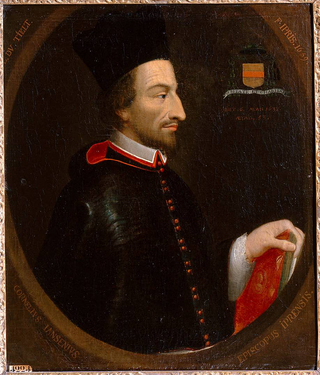
Jansenism was an early modern theological movement within Catholicism, primarily active in the Kingdom of France, that arose in an attempt to reconcile the theological concepts of free will and divine grace. Jansenists claimed to profess the true doctrine of grace as put forth by Augustine of Hippo. In 1653, Pope Innocent X promulgated the bull Cum occasione, which condemned five errors attributed to Jansenism, including the idea that Christ did not die or shed his blood for all men.
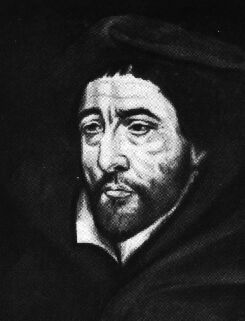
Michael Baius was a Belgian theologian. He formulated the school of thought now known as Baianism.

The Catholic University of Leuven or Louvain was founded in 1834 in Mechelen as the Catholic University of Belgium, and moved its seat to the town of Leuven in 1835, changing its name to Catholic University of Leuven. In 1968, it was split into two universities, the Katholieke Universiteit Leuven and the Université catholique de Louvain, following tensions between the Dutch and French-speaking student bodies.

Cornelius Jansen was the Dutch Catholic bishop of Ypres in Flanders and the father of a theological movement known as Jansenism.

Antoine Arnauld was a French Catholic theologian, philosopher and mathematician. He was one of the leading intellectuals of the Jansenist group of Port-Royal and had a very thorough knowledge of patristics. Contemporaries called him le Grand to distinguish him from his father.

UCLouvain or Université catholique de Louvain is Belgium's largest French-speaking university. It is located in Louvain-la-Neuve, which was expressly built to house the university, and Brussels, Charleroi, Mons, Tournai and Namur. Since September 2018, the university has used the branding UCLouvain, replacing the acronym UCL, following a merger with Saint-Louis University, Brussels.
Baianism is a term applied to the school of thought of Catholic theologian Michael Baius (1513-1589). Its foremost apologists, Baius among them, largely claimed this school and its teachings to be a return to a sort of Augustinianism, against the reliance on Scholasticism and Scholastic writings which held sway over most Catholic theologians at the time. It is the immediate historical predecessor of Jansenism, and, as with Jansenism, has been deemed non-orthodox by the Catholic Church.

The Lettres provinciales are a series of eighteen letters written by French philosopher and theologian Blaise Pascal under the pseudonym Louis de Montalte. Written in the midst of the formulary controversy between the Jansenists and the Jesuits, they are a defense of the Jansenist Antoine Arnauld from Port-Royal-des-Champs, a friend of Pascal who in 1656 was condemned by the Faculté de Théologie at the Sorbonne in Paris for views that were claimed to be heretical. The first letter is dated January 23, 1656 and the eighteenth March 24, 1657. A fragmentary nineteenth letter is frequently included with the other eighteen.

The Congregatio de Auxiliis was a commission established by Pope Clement VIII to settle a theological controversy regarding divine grace that had arisen between the Dominicans and the Jesuits towards the close of the sixteenth century. It was presided over for a time by Peter Lombard, Archbishop of Armagh.
The formulary controversy was a 17th- and 18th-century Jansenist refusal to confirm the Formula of Submission for the Jansenists on the part of a group of Catholic ecclesiastical personnel and teachers who did not accept the charge that their beliefs about the nature of man and grace were heretical as the Holy See declared. In the Kingdom of France, it pitted Jansenists against Jesuits. It gave rise to French theologian Blaise Pascal's Lettres provinciales, the condemnation of casuistry by the Holy See, and the dissolution of organised Jansenism.
Jacques-Hyacinthe Serry (1659–1738) was a French Dominican Thomist theologian, controversialist and historian.
Nicolas Cornet was a French Catholic theologian.
Jan Hessels, Jean Leonardi Hasselius or Jean Hessels was a Flemish theologian and controversialist at the University of Louvain. He was a defender of Baianism.

The Leuven Faculty of Theology was a branch of the Catholic University of Leuven, founded in 1834 in Mechelen by the bishops of Belgium as the Catholic University of Belgium, that moved its seat to the town of Leuven in 1835, changing its name to Catholic University of Leuven.
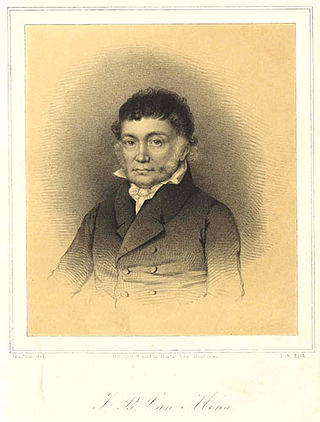
The State University of Leuven was a university founded in 1817 in Leuven in Belgium, then part of the United Kingdom of the Netherlands. It was distinct from the Old University of Leuven (1425-1797) and from the Catholic University of Leuven, which moved from Mechlin to Leuven after the State University had been closed in 1835.

The Old University of Leuven is the name historians give to the university, or studium generale, founded in Leuven, Brabant, in 1425. The university was closed in 1797, a week after the cession to the French Republic of the Austrian Netherlands and the principality of Liège by the Treaty of Campo Formio.
The city of Leuven, in the former Duchy of Brabant, has been the seat of four universities:

Pierre Simons (1538—1605) was a theologian and the second bishop of Ypres.
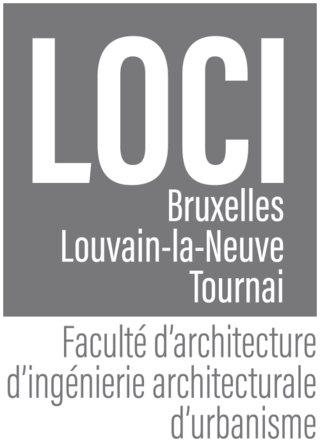
The Faculty of Architecture, Architectural Engineering and Urban Planning, often called LOCI, is the 14th faculty of the University of Louvain, Belgium. It became an independent faculty in 2009, with the merger of three institutes founded between 1867 and 1882, and is active in Brussels (Saint-Gilles), Tournai and Louvain-la-Neuve.
Franciscus Lucas Brugensis or François Luc de Bruges (1548/9–1619) was a Roman Catholic biblical exegete and textual critic from the Habsburg Netherlands.
